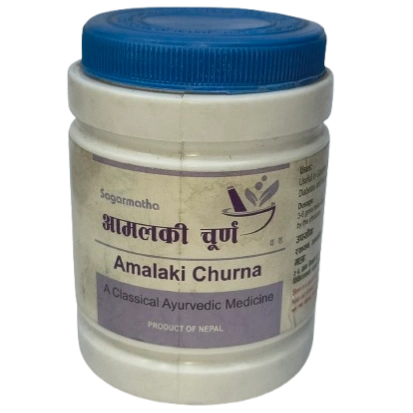

Sagarmatha Amalki Churna
0
Shipping is calculated at checkout
Description
Amalaki is a rich source of nutrients, including vitamin C, amino acids, pectin, and antioxidant-rich polyphenols such as tannins and gallic acid
Amalaki also has anti-inflammatory, anti-diabetic, antifungal, antiviral, and antibacterial properties.
In Ayurvedic medicine, amalaki has been used to treat a variety of conditions, including:
Anemia
Diarrhea
Inflammation
Jaundice
Diabetes
Ayurvedic practitioners also believe amalaki improves the functioning of the liver, heart, brain, and lungs.
Although the efficacy of amalaki for treating these conditions in particular has not been proven, the fruit has been studied as a treatment for heartburn, high cholesterol, and diabetes.
Many of these studies show promising results, but more evidence is needed to determine whether amalaki can be used as a complementary treatment for specific conditions.
Heartburn
Studies have shown that amalaki may be beneficial in treating heartburn. A 2018 study tested 68 people who had symptoms of gastroesophageal reflux disease (GERD).
One group was given two 500-milligram (mg) amalaki tablets twice a day after meals, while the other group was given a placebo (an inactive pill). After four weeks, the people who took the amalaki tablets had a significant reduction in heartburn and regurgitation symptoms.
High Cholesterol
Amalaki may have some benefits in preventing hyperlipidemia, which is characterized by abnormally high levels of lipids (fats) in the blood.
Diabetes
Amalaki may help to control blood glucose and blood lipid levels as well as protect against diabetic neuropathy and retinopathy.
Immunity
Because amalaki is rich in antioxidants such as gallic acid, ascorbic acid, and phenolic compounds, it is thought to help the body’s immune system by:
Increasing the production of white blood cells, which help fight off infections
Protecting immune cells from damage caused by free radicals
Having anti-inflammatory effects, which can be beneficial for immune function because inflammation can impair immune responses
However, research is limited, and some of the results come from animal studies, so more research is needed to confirm any immunity benefits in humans.
Age-Related Conditions
A study of people aged 45 to 60 revealed that amalaki helped maintain the length of DNA telomeres, structures located at the ends of chromosomes to protect them from damage.
As cells divide, telomeres tend to become shorter. They eventually become too short for the cells to divide, meaning they age rather than replicate.
The researchers concluded that because amalaki helped maintain the length of telomeres, it may promote healthy aging over time. Further research is needed to determine how amalaki might affect aging and age-related diseases.
Other Potential Benefits
Liver health: Amalaki could have some protective effects on the liver, but studies are limited. According to a 2013 review, amalaki.
Hair and skin: Amalaki is sometimes used in beauty products because of its antioxidant and anti-inflammatory effects. Amalaki is thought to strengthen hair as well as brighten your complexion, but there is little scientific evidence to back these claims.
Cancer: Research suggests that amalaki may have anticancer properties, but so far, the research has been in laboratory and animal studies only. These studies have suggested that amalaki may inhibit the growth and invasion of several human cancer cell types, and its antioxidants may help protect cells from damage that can lead to cancer.
0
